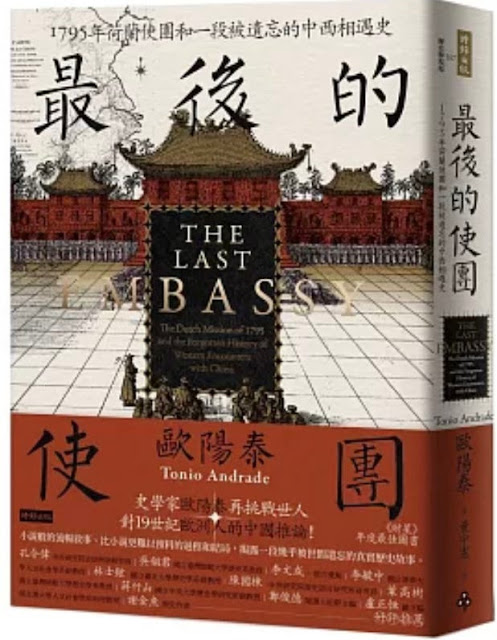有评论说,欧阳泰是当代历史学界的魔术师。一方面他的史学著作写得纵横捭阖、见时代与世界大势;另一方面却历史人物跃然纸上,相隔时空与读者对望。2024年5月,在推出欧阳泰汉学经典三书之后,时报出版再次推出欧阳泰的历史著作《最后的使团:1795年荷兰使团和一段被遗忘的中西相遇史The Last Embassy: The Dutch Mission of1795 and the Forgotten History of Western Encounters with China》。
如今,欧阳泰有许多广为人知的标签,汉学家、台湾史学家、世界史学界、东亚历史学家等,但很少有人知道在Reedcollege读本科的时候,一开始主修是生物学与神经科学;之后因为对中文感兴趣,他开始学习中文。1989年,他去台湾师范大学读了半年的中文。
1992年,欧阳泰在Reed College毕业后,进入伊利诺伊大学香槟分校University of Illinois读硕士。在此期间,他阅读了狄奥多.施笃姆(Therdor Storm)的德文小说《白马骑士》(Der Schimmelreiter),而受到佛里斯兰文化(Frisian Culture)吸引,没原由地沉迷于荷兰文,并开始学习荷兰文。
1994年,硕士毕业后,欧阳泰去耶鲁大学攻读历史学博士。在这里他遇到两位老师。一位是帕克(Geoffrey Parker);另一位是史景迁。帕克是一位军事革命论学者,专门研究现代早期西欧,西班牙和战争的历史。他最着名的书是剑桥大学出版社于1988年首次出版的《军事革命:军事创新与西方的兴起,1500年—1800年The Military Revolution: Military Innovation and the Rise of the West,1500–1800》;而中国读者的熟悉的史景迁则擅长书写历史人物与个性。在两位老师的影响和启发下,欧阳泰开始了自己的学术旅程,选择中国海洋史作为论文主题,讨论荷兰东印度公司与中国之间的关系,并比较菲律宾跟巴达维亚历史。。
在自己的学术研究中,欧阳泰提出了“全球微观史”(micro-global history)的观点,既从宏观去诠释世界历史发展的大趋势,也透过历史角色讲述历史下的时空。“他认为一名历史学者应该有两个层面:身为理论的建构者,同时也成为说故事的人。”(卢正恒:《他是“建构理论的人”也是“说故事的人”──历史学家欧阳泰》)
对于欧阳泰的著作,或许用他自己的话介绍最好:
My first book,How Taiwan Became Chinese(2007), examined how Dutch, Spanish, and Chinese colonization met and competed in the Far East and asked why it was that the Chinese prevailed over the Europeans rather than the other way around, suggesting that political will– that is to say state support for expansion– was a key variable. My second book,Lost Colony(2011), examined the Sino-Dutch War of1661-1668, Europe’s first war with China and the only significant Sino-European conflict until the Opium War of1839–42. It asked whether Europeans had– at this early date– any significant advantages in military and naval technology over China and concluded that they did, although not perhaps in the areas people might have expected. My third book,The Gunpowder Age(2016), looked more deeply into China’s military past, comparing it to that of Europe, and showing that China’s China’s dynamism was deeper, longer lasting, and more quickly recovered than has long been believed. My fourth book, The Last Embassy(2021), examined a little-known but richly documented Dutch embassy to the court of the Qing dynasty’s Qianlong Emperor. I’m currently working on a book about the Dutch East India Company and its interactions with and effects on Asia’s maritime realms.
前三本著作《福尔摩沙如何变成台湾府?》(How Taiwan Became Chinese)、《决战热兰遮》(Lost Colony)和《火药时代》(The Gunpowder Age),在台湾早已翻译出版,被称为“欧阳泰汉学经典三书”,欧阳泰也因为他对台湾早期历史的书写而深受台湾人的喜爱。最近,第四本著作《最后的使团》(The Last Embassy)中文版也在台湾出版。为此,波士顿书评特别采访了欧阳泰教授,采访通过邮件进行。访谈用英文进行,书评翻译成中文。

书评: You once joked that when you graduated in2000, because you studied global history(world history), you thought you might only find a teaching position at a community college. Was this because global history was not yet popular in American universities at the time?
你曾开玩笑说,2000年毕业的时候,因为自己学习的是全球史(世界史),认为自己可能只能在社区大学找到教职。这是因为全球史在当时美国大学还不是很流行吗?
欧阳泰:Yes, at that point, most historians didn’t know what global history was. My graduate course on the topic was one of the first to be offered. Things began changing quickly after around2010. Today, global history is a major subfield within the discipline, and there are scores of books published each year in global history.
欧阳泰:是的,当时大多数历史学家都不知道什么是全球史。我研究生时候读的关于这个主题的课程是最早开设的课程之一。2010年左右,情况开始迅速改变。如今,全球历史已成为该学科的一个主要分支,每年都会出版数十本全球历史书籍。
书评: At least among Chinese readers, global history seems to have only become popular in recent years, and people seem to be getting tired of history narrated by country and history dominated by elite politics. Does the popularity of global history represent a change in ideological trends?
至少在中文阅读内,全球史似乎是近年来才开始流行起来,人们似乎开始厌倦以国别来叙述的历史和精英政治为主的历史。全球史的流行,是不是背后代表一种思潮的变化?
欧阳泰:For me, one of the fascinating developments of the past three decades within the discipline of history is the explosion of serious history being produced outside of the west, particularly in China. This trend started to pick up speed in the1990s, and by the2000s and2010s, Chinese-language scholarship in history was expanding at a dramatic clip, with new institutes, new journals, even new universities being founded yearly, particularly in the PRC. It was a renaissance in historical scholarship. I see this as part of the general zeitgeist, which global history is also part of. To build a history for all humans– regardless of race, ethnicity, or nationality– is the great goal of global historians, and the only way to do that is to listen to each other, to incorporate other historical and historiographical traditions.
欧阳泰:对我来说,过去三十年历史学领域最令人着迷的发展之一是西方以外、特别是中国产生的严肃历史的爆发。这一趋势在20世纪90年代开始加速,到2000年代和2010年代,中文历史学术急剧扩张,每年都会建立新的研究所、新的期刊,甚至新的大学,特别是在中国。这是历史学术的复兴。我认为这是整体时代精神的一部分,全球历史也是其中的一部分。为全人类——无论种族、族裔或民族——建立历史是全球历史学家的伟大目标,而实现这一目标的唯一方法就是互相倾听,吸收其他历史和史学传统。
书评: You study global history through Taiwan and the encounter between China and the West through Taiwan. Did you plan this beforehand, or was it just an accident?
你通过台湾来研究全球史,通过台湾来研究中西方的相遇。这是你事先计划好了,还是一种偶然?
欧阳泰:It was an accident. I was very interested in cross-cultural interactions, but I didn’t originally intend to study Taiwan per se. I started my undergraduate career studying science, thinking I would specialize in biology or neuroscience, but the summer after my first year, I worked in a lab, where I met a brilliant Chinese researcher, who told me about his experience in the Cultural Revolution. This encounter sparked an interest in the Chinese language, which I began studying. I decided to put my undergraduate degree on hold, spending half a year in Taiwan. When I returned to college, I changed my major to anthropology. During my final year in college, however, I took two history classes. I was hooked and applied to graduate school in history. At first I thought I’d write a dissertation on the history of anthropology but ultimately came to be interested in early European colonialism and, in particular, in the Dutch East India Company. When I learned that the Dutch East India Company had held a colony on Taiwan, I became fascinated by it, and ended up writing my dissertation on the topic.
这是一次意外。我对跨文化交流很感兴趣,但我本来并没有打算研究台湾本身。我以科学开始我的本科生学习生涯,本以为我会专攻生物学或神经科学,但第一年后的夏天,我在一个实验室工作,在那里我遇到了一位出色的中国研究员,他向我讲述了他在文化大革命中的经历。这次邂逅激发了我对汉语的兴趣,并开始学习汉语。我决定暂缓本科学业,去台湾待半年。当我回到大学后,我把专业改为人类学。然而,在大学的最后一年,我选修了两门历史课。我被迷住了并申请了历史研究生院。起初我想写一篇关于人类学史的论文,但最终对早期欧洲殖民主义,特别是荷兰东印度公司感兴趣。当我得知荷兰东印度公司在台湾拥有殖民地时,我对此感到着迷,并最终以此为主题写了我的博士论文。





